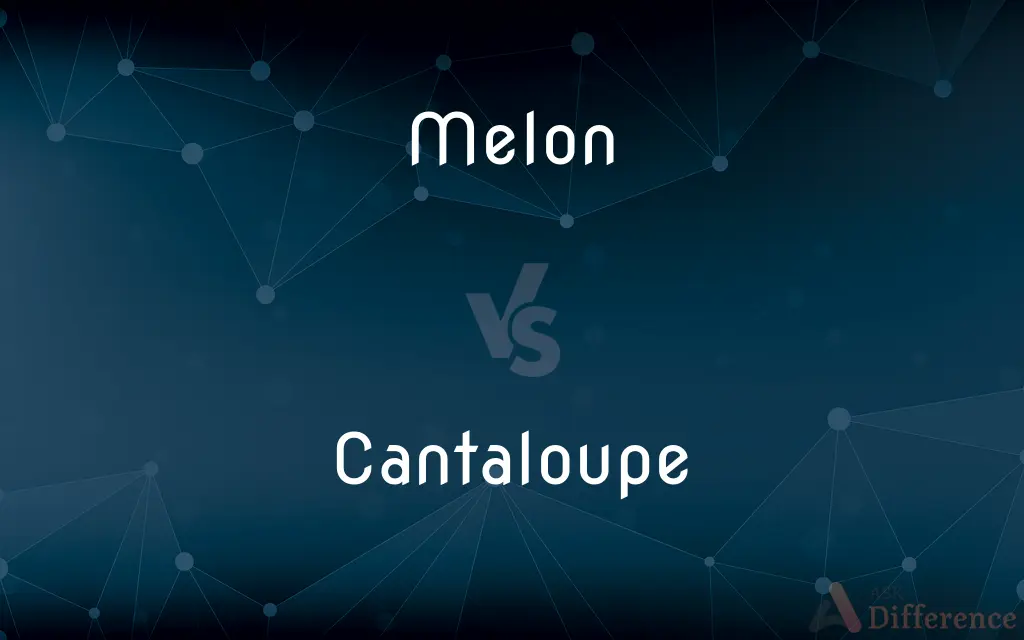Melon vs. Cantaloupe — What's the Difference?
By Fiza Rafique & Urooj Arif — Updated on March 9, 2024
Melons are a diverse group of fruits known for their sweet and juicy flesh, while cantaloupe is a specific type of melon characterized by its netted skin and sweet orange flesh.

Difference Between Melon and Cantaloupe
Table of Contents
ADVERTISEMENT
Key Differences
Melons are part of the Cucurbitaceae family, which includes a wide variety of species and cultivars, each with distinct flavors, textures, and appearances. Cantaloupes, or muskmelons, represent a specific subgroup within the melon family, notable for their ribbed, net-like skin and sweet, orange flesh. While all cantaloupes are melons, not all melons are cantaloupes.
The term "melon" encompasses a broad range of fruits, including watermelons, honeydew melons, and cantaloupes, among others. These fruits can vary significantly in taste, from the subtly sweet flavors of honeydew to the rich sweetness of cantaloupe. On the other hand, cantaloupe specifically refers to a type of melon with a distinct flavor profile that is often described as both sweet and slightly musky.
Melons, in general, are grown worldwide and come in various shapes and sizes, from the large and elongated watermelon to the smaller, round cantaloupes. The versatility of melons allows them to be used in a wide range of culinary applications, from fresh salads and desserts to savory dishes. Cantaloupes, with their particularly sweet flavor and tender flesh, are often enjoyed fresh, either alone or as part of fruit salads, desserts, and smoothies.
The nutritional profiles of melons vary, but they are generally rich in vitamins, minerals, and hydration due to their high water content. Cantaloupes are especially noted for their high levels of vitamin A and C, contributing to immune system health, skin health, and vision.
Melons have a seasonal growth cycle, with availability varying by type and region. Cantaloupes, for example, are typically in season during the summer months, which is when they are at their peak of sweetness and flavor. This seasonal variation influences both the availability and taste of different melon types throughout the year.
ADVERTISEMENT
Comparison Chart
Definition
A diverse group of fruits in the Cucurbitaceae family.
A specific type of melon with netted skin and sweet orange flesh.
Varieties
Includes watermelon, honeydew, cantaloupe, and more.
A specific variety within the melon category.
Taste
Varies from subtly sweet to richly sweet.
Sweet and slightly musky.
Culinary Uses
Used in fresh salads, desserts, savory dishes, and beverages.
Often enjoyed fresh, in salads, desserts, and smoothies.
Nutritional Value
Generally high in vitamins, minerals, and water.
Rich in vitamin A and C, promoting skin and immune health.
Compare with Definitions
Melon
Hydration Source.
Melons are known for their high water content, making them a refreshing snack.
Cantaloupe
Sweet Flavor.
Cantaloupe's distinct sweetness makes it a favorite in fruit salads and desserts.
Melon
Nutritional Benefits.
Melons are a good source of vitamins and minerals, supporting overall health.
Cantaloupe
Specific Variety.
Cantaloupe is recognized by its net-like skin and sweet, orange flesh.
Melon
Seasonal Availability.
Different melons are available at various times of the year, depending on their specific growing season.
Cantaloupe
Summer Fruit.
Cantaloupe is best enjoyed in the summer when it's in season and at its peak flavor.
Melon
Diverse Family.
The melon family includes a variety of species, each with unique tastes and textures.
Cantaloupe
Musky Aroma.
The slightly musky aroma of cantaloupe distinguishes it from other melons.
Melon
Culinary Versatility.
Melons can be used in everything from fresh salads to smoothies and desserts.
Cantaloupe
Rich in Vitamins.
High in vitamin A and C, cantaloupe supports immune function and skin health.
Melon
A melon is any of various plants of the family Cucurbitaceae with sweet, edible, and fleshy fruit. The word "melon" can refer to either the plant or specifically to the fruit.
Cantaloupe
The cantaloupe, rockmelon (Australia and New Zealand), sweet melon, or spanspek (South Africa) is a melon that is a variety of the muskmelon species (Cucumis melo) from the family Cucurbitaceae. Cantaloupes range in weight from 0.5 to 5 kilograms (1 to 11 lb).
Melon
The large round fruit of a plant of the gourd family, with sweet pulpy flesh and many seeds
A slice of melon
A ripe melon will smell sweet
Cantaloupe
A variety of melon (Cucumis melo) having a tan rind with netlike ridges and sweet fragrant orange flesh.
Melon
The Old World plant which yields the melon.
Cantaloupe
Any of several other similar melons.
Melon
A waxy mass in the head of dolphins and other toothed whales, thought to focus acoustic signals.
Cantaloupe
A melon of species Cucumis melo subsp. melo with sweet orange flesh, with numerous cultivars in several cultivar groups.
Melon
Any of various vines of the family Cucurbitaceae, especially Cucumis melo or Citrullus lanatus, widely cultivated for their edible fruit.
Cantaloupe
Smooth-skinned, also known as true cantaloupe, found in the Middle East and also grown in Europe.
Melon
The fruit of any of these plants, having a hard rind and juicy flesh.
Cantaloupe
Having a rough skin resembling netting; also known as muskmelon or rockmelon.
Melon
A fatty structure in the forehead of cetaceans, especially the toothed whales, thought to be used in the production of high-frequency sounds.
Cantaloupe
An orange colour, like that of cantaloupe flesh.
Melon
Melons Vulgar Slang A woman's breasts.
Cantaloupe
A muskmelon of several varieties, having when mature, a yellowish skin, and flesh of a reddish orange color.
Melon
(countable) Any of various plants of the family Cucurbitaceae grown for food, generally not including the cucumber.
Cantaloupe
A variety of muskmelon vine having fruit with a tan rind and orange flesh
Melon
Genus Cucumis, various musk melons, including honeydew, cantaloupes, and horned melon.
Cantaloupe
The fruit of a cantaloup vine; small to medium-sized melon with yellowish flesh
Melon
Genus Citrullus, watermelons and others
Melon
Genus Benincasa, a winter melon
Melon
Genus Momordica, a bitter melon
Melon
(uncountable) Fruit of such plants.
Melon
(uncountable) A light pinkish orange colour, like that of some melon flesh.
Melon
Breasts.
Melon
The head.
Think! Use your melon!
Melon
A member of the Green Party, or similar environmental group.
Melon
(countable) A mass of adipose tissue found in the forehead of all toothed whales, used to focus and modulate vocalizations.
Melon
(chemistry) The result of heptazine being polymerized with the tri-s-triazine units linked through an amine (NH) link.
Melon
Of a light pinkish orange colour, like that of melon flesh.
Melon
The juicy fruit of certain cucurbitaceous plants, as the muskmelon, watermelon, and citron melon; also, the plant that produces the fruit.
Melon
A large, ornamental, marine, univalve shell of the genus Melo.
Melon
Any of numerous fruits of the gourd family having a hard rind and sweet juicy flesh
Melon
Any of various fruit of cucurbitaceous vines including: muskmelons; watermelons; cantaloupes; cucumbers
Common Curiosities
What's the best way to store melons?
Before cutting, store melons at room temperature. After cutting, refrigerate them in an airtight container.
Is cantaloupe healthier than other melons?
Cantaloupe is particularly high in vitamins A and C, but all melons have health benefits and nutritional value.
Can all melons be used interchangeably in recipes?
While many can be used in similar ways, differences in taste and texture may affect the outcome of a dish.
How do you know when a cantaloupe is ripe?
A ripe cantaloupe will have a sweet fragrance and slightly yield to pressure at the blossom end.
Are there seedless melon varieties?
Some melon varieties, like certain types of watermelon, have been cultivated to be seedless.
What makes cantaloupe different from other melons?
Cantaloupe is distinguished by its netted skin and specific sweet, slightly musky flavor.
Do all melons have the same skin texture?
No, melon skin textures vary widely, from the smooth skin of honeydew to the netted texture of cantaloupe.
Why do melons have different seasons?
Melons have varying growth cycles and climatic requirements, leading to different seasonal availabilities.
How long do melons last after cutting?
When stored properly in the refrigerator, cut melons can last up to a week.
Can you freeze melons?
Yes, melons can be frozen, though their texture may change, making them best suited for smoothies or purees.
Are melons good for hydration?
Yes, their high water content makes melons excellent for hydration.
What is the nutritional difference between cantaloupe and honeydew?
Cantaloupe is higher in vitamins A and C, while honeydew offers different nutritional benefits, such as vitamin K.
Can you cook with cantaloupe?
While cantaloupe is often eaten fresh, it can also be used in cooking, such as in soups or grilled dishes.
Can melons be grown in any climate?
While melons prefer warm climates, many types can be grown in a range of conditions with proper care.
What are the best uses for overripe melons?
Overripe melons can be used in smoothies, juices, or cooked dishes where the texture is less important.
Share Your Discovery

Previous Comparison
Boi vs. Bol
Next Comparison
Teeth vs. ToothAuthor Spotlight
Written by
Fiza RafiqueFiza Rafique is a skilled content writer at AskDifference.com, where she meticulously refines and enhances written pieces. Drawing from her vast editorial expertise, Fiza ensures clarity, accuracy, and precision in every article. Passionate about language, she continually seeks to elevate the quality of content for readers worldwide.
Co-written by
Urooj ArifUrooj is a skilled content writer at Ask Difference, known for her exceptional ability to simplify complex topics into engaging and informative content. With a passion for research and a flair for clear, concise writing, she consistently delivers articles that resonate with our diverse audience.














































